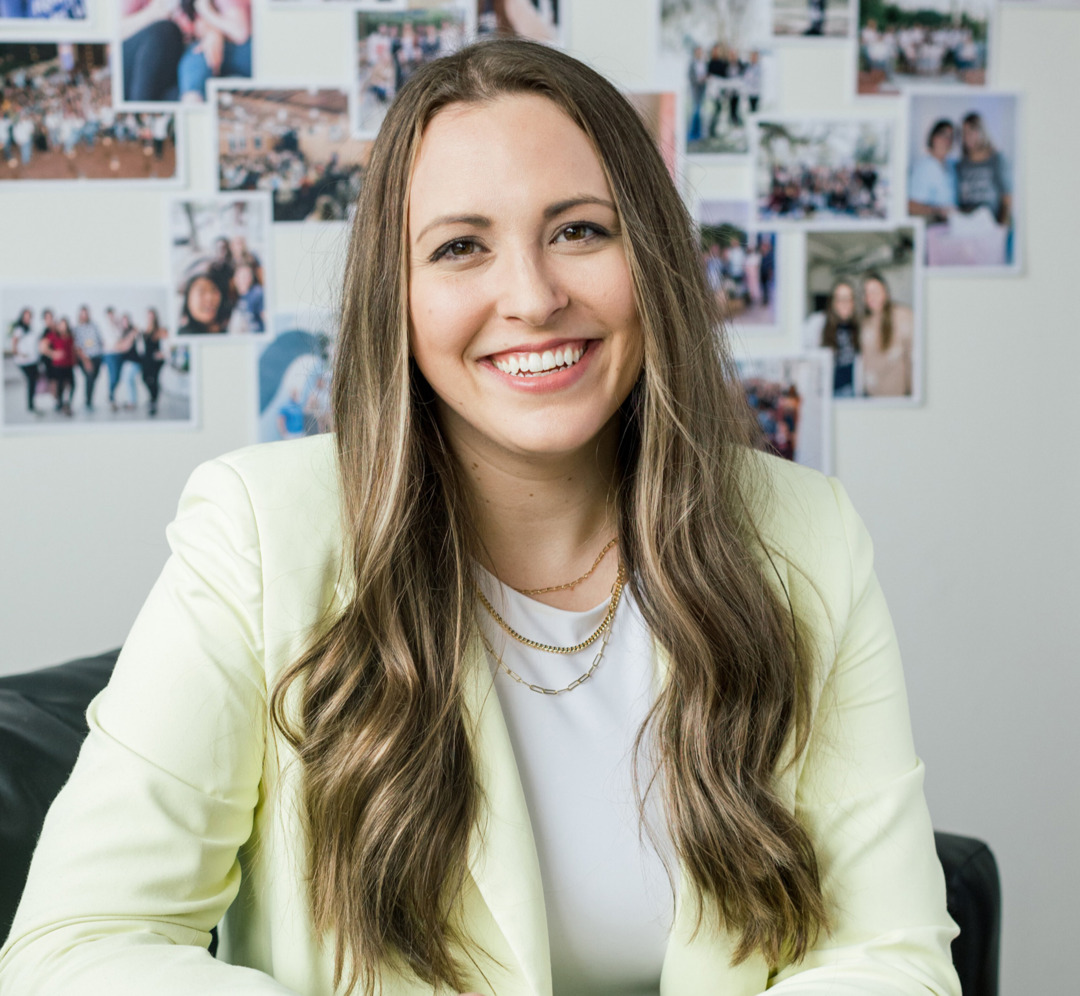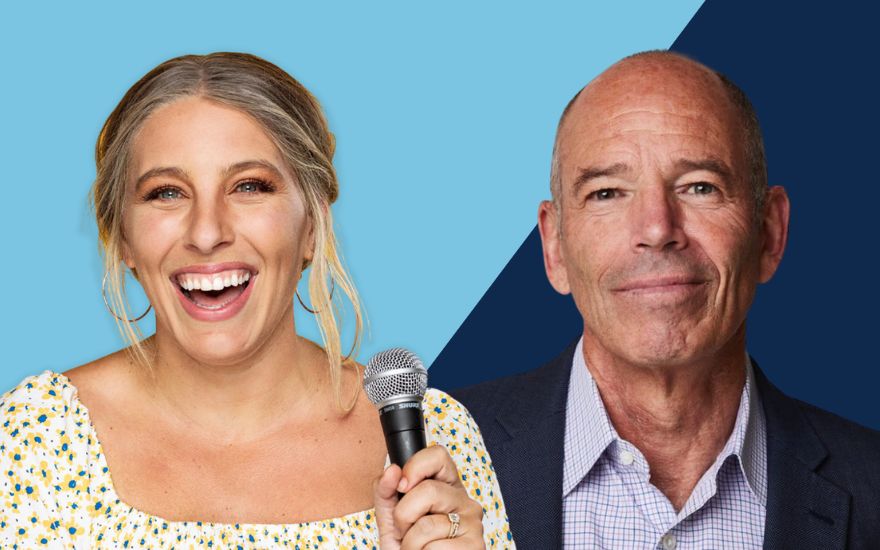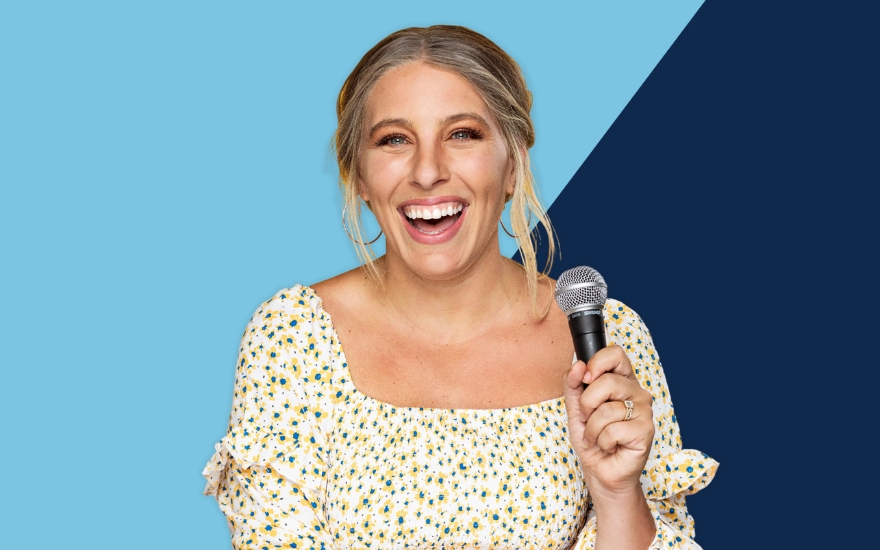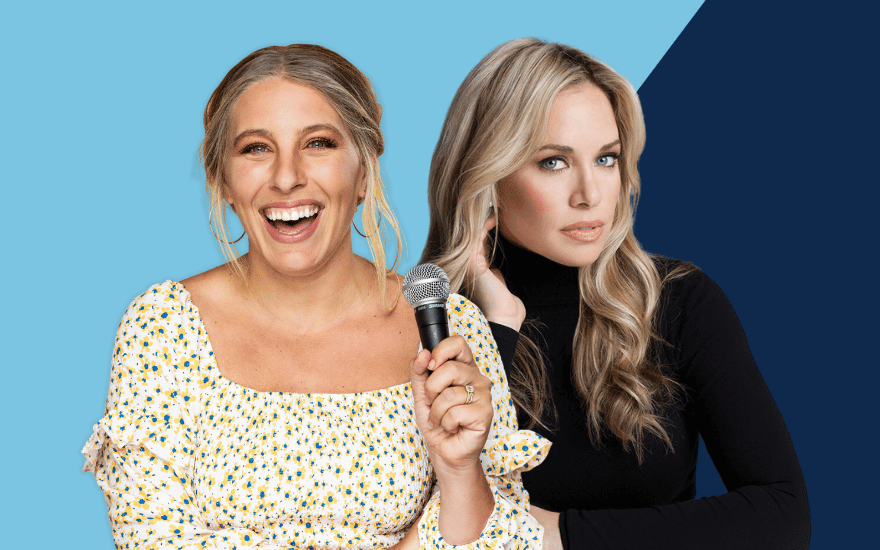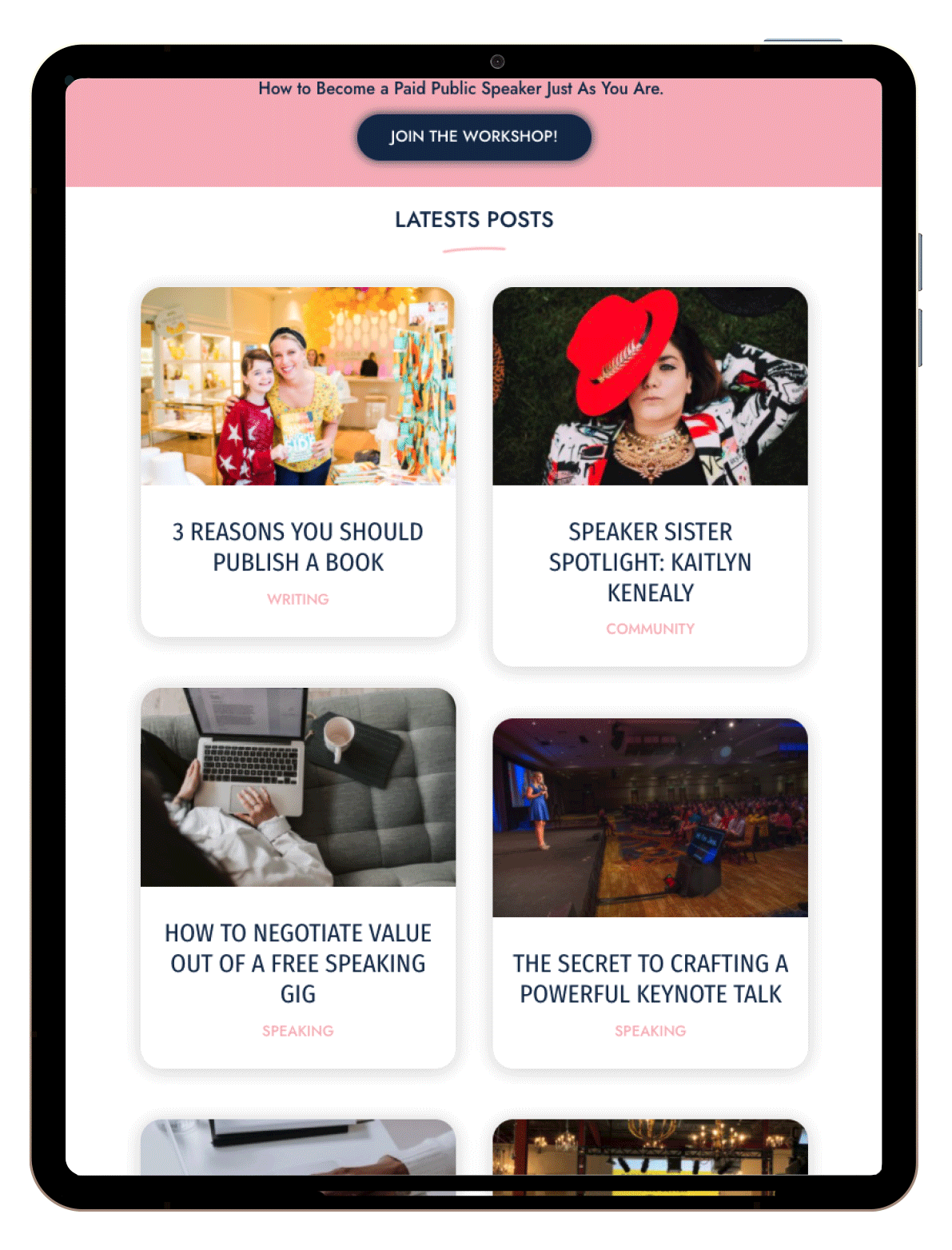


Having the Guts to Face Your Fears, with Natalie Franke



JUMP TO
PODCAST HOME
LISTEN TO THE EPISODE
ON THIS EPISODE OF AMPLIFY
Whenever we step on stage, we’re making a courageous choice to be there and share our authentic selves with the audience.
But what does it mean to be gutsy?
Today, Natalie Franke shares her personal journey of facing a brain tumor diagnosis and infertility, while building her career.
Jess and Natalie emphasize the continuous learning process of courage and the significance of self-reflection and embracing change. They also discuss the power of vulnerability, community support, and the value of integrity in personal and professional growth.
Natalie Franke is the Head of Community at Flodesk and author of Gutsy: Learning to Live With Bold, Brave, and Boundless Courage.
FOLLOW Natalie
ABOUT OUR GUEST – Natalie Franke
Natalie Franke is the Head of Community at Flodesk and author of Gutsy: Learning to Live With Bold, Brave, and Boundless Courage.
SHOW NOTES
Whenever we step on stage, we’re making a courageous choice to be there and share our authentic selves with the audience.
But what does it mean to be gutsy?
Today, Natalie Franke shares her personal journey of facing a brain tumor diagnosis and infertility, while building her career.
Jess and Natalie emphasize the continuous learning process of courage and the significance of self-reflection and embracing change. They also discuss the power of vulnerability, community support, and the value of integrity in personal and professional growth.
Natalie Franke is the Head of Community at Flodesk and author of Gutsy: Learning to Live With Bold, Brave, and Boundless Courage.
[00:02] Courage looks different for everyone.
[03:20] Evolution of Natalie’s struggles and gutsiness.
[06:16] How Natalie changed her perspective on courage.
[10:13] Fear is natural but keep moving forward.
[12:56] The impostor syndrome advantage.
[18:46] Finding authenticity in breaking free.
[23:49] Building your inner circle.
Amplify with Jess is produced by Earfluence, and brought to you by Mic Drop Workshop.
TRANSCRIPT
Natalie Franke – 00:00:02:
Being Gutsy is going to look different season to season. Being courageous for you might be different than the way your friend is going to need to be courageous. And it isn’t a competition. Comparison in the context of courage is only a distraction. It really requires you to look within and say, what do I need to be brave in this moment? When I was going in for surgery, it was simply going in for surgery, having the courage to have faith that I was going to come out on the other side and be able to recover. And regardless of what I would face, that I would keep pushing forward.
Jess Ekstrom – 00:00:33:
Welcome to Amplify with Jess Ekstrom, a show designed to help women get out of their head and into their zone of influence. So today we have one of my dear, dear friends, Natalie Franke, joining us. She is the author of Gutsy, which is already a USA Today bestseller. Thank you so much for being here. I loved Built to Belong, but Gutsy is incredible. There is, of course, it is a USA Today bestselling book, which I’ve learned was a surprise to you.
Natalie – 00:01:06:
I was not expecting it. I don’t think any of us really were expecting it. And yeah, very, very much a good surprise.
Jess – 00:01:15:
So I think one of the things that I want to talk about first is really our origin story of how we met. Because admittedly, I was in a season of building my business where I felt like I had to win. And when you have that mindset of like, well, I have to beat everyone in order to succeed, it can be very isolating. It can be very draining. And it’s also just not fun. And so when I met you and you had built this like rising tide and this, you had written Built to Belong and or you were writing it and you had this motto as a speaker of like community over competition and we work better together. At first I was like, okay, like Hakuna Matata, Natalie. But then when I saw you practice that in life and I just realized how much better things can be when we work together. It really changed the way I approach just my life. But also it changed the way that we approach Mic Drop Workshop where it’s a community now speaker sisters that are for each other’s opportunities and all of these things. And that started because I met you.
Natalie – 00:02:22:
Well, I love that. It’s so funny to hear you say that because I felt from the very first moment I met you that we shared the same values in that respect. And so both of us are very competitive, right?
Jess – 00:02:34:
Yes. Enneagram threes over here.
Natalie – 00:02:36:
Yeah. Threes. But also you were one of the first authors that really shared with me about your journey and about what you were learning and with keynote speaking, shared opportunities with me. So I love hearing that. But also I think you’ve been that leader for a long time for so many people. And so the more that you continue to share that and as you grow with this community that is thriving and supporting each other, we’re going to transform the way that speakers work with one another, the way that women in entrepreneurship work with one another through conversations like this. And so I am just so honored to call you a friend and so grateful for all that you do in the world.
Jess – 00:03:12:
The feeling is mutual. So I think from the outside looking in, I mean, you’ve built incredible businesses, podcasts, books, all of it. You might just believe, okay, Natalie Franke has always had the chutzpah, has always had the guts to go for it. Is that true or was being gutsy something that was learned?
Natalie – 00:03:33:
Yeah, look, it’s an evolution. It’s even now, right? There’s a section in Gutsy where I say, I don’t speak from a pedestal of having conquered this. I write about the very things I struggle with most. So when you see me writing, for example, with Built to Belong about community and community over competition, it’s because I struggled with loneliness and I struggled with comparison. And I felt like every day I was showing up to social media with boxing gloves on, trying to ward off the comparison monster that was threatening to destroy me. When I write Gutsy, it’s not because I’m a gutsy person by design and that I’ve always been that way. It’s because I feel as though I have spent so much of my life fighting against the expectations of who I should be. And I know there are a lot of people out there listening to this that have dreams that they’ve put on the back burner or have always wanted to speak. And maybe this is the first time in your life you’re admitting that to yourself, that you are truly embracing this possibility for your life and taking that first step. I’m right there with you. So no, I have not always felt that way. I am very much a student as much as I am a teacher. I say that gutsy is, let’s say, a thesis after years of research that’s still being evolved. It’s a cookbook where I no longer set off the fire alarm when I attempt to make dinner, but I am far from a Michelin star chef. And it’s one in which I feel like I can really speak from the trenches rather than from sort of theoretical position, looking at what life really is like for us. I’m in it and I’m doing it every single day.
Jess – 00:05:04:
I think that’s a really important distinction for thought leadership in general. I think that there’s this belief that in order to speak right or provide value on a certain topic or an area, that it has to be innate within you. And I think it’s quite the opposite. Like in order for you to teach how to be gutsy or how to be optimistic or whatever it might be, it’s most of the time you are the student. It’s kind of hard to trust the source where you’re like, oh yeah, I just like was a baby and I was just like swinging from zip lines. Like I always had guts. And you’re like, no, I didn’t. So is there like a certain time in your life or maybe it’s a part in the book where you started to believe like, okay, I need to change something. Like what was that student moment for you?
Natalie – 00:05:55:
Yeah. So I like to say like every day that I’m alive is an opportunity to learn and to grow. But beyond that very cheesy cliche of a statement, I would say that in my early 20s, I was diagnosed with a benign brain tumor. And in my mid to late 20s, I went in for brain surgery to have it removed. And it was truthfully in the preparation for surgery and in the recovery season of my life where I just, I think I was forced to look at things very differently, to look at time very differently, to stop feeling as though tomorrow was promised and I could take any minute for granted, but also acknowledge the fact that I have to go after the things that I want. No one is going to give you the life that you want. That’s not how this works. If there’s something that’s been placed on your heart, even if you were created to do that thing, it doesn’t mean it’s going to be handed to you, right? You have to do the work of uncovering what your gifts are, how you can grow. And all of that requires courage. I even say in gutsy, being gutsy is going to look different season to season. Being courageous for you might be different than the way your friend is going to need to be courageous. And it isn’t a competition. Comparison in the context of courage is only a distraction. It really requires you to look within and say, what do I need to be brave in this moment? When I was going in for surgery, it was simply going in for surgery, having the courage to have faith that I was going to come out on the other side and be able to recover. And regardless of what I would face, that I would keep pushing forward. In other seasons, it was going through infertility, having the courage to make hard decisions either way, postpartum. Like, you know, right now in marriage, we’re 10 years of marriage, having the courage to believe that I can continue to grow, to be the partner that my husband deserves, and that I can continue to be vulnerable as we change, as our lives change in business and life. You name it. Being gutsy today looks different than it looked yesterday. And for you, it will as well. And so I think it is, you know, embracing that and also seeing those moments for me, you know, going through tough times where I love that you’re like, if it always came naturally to you, you know, maybe that’s not even the thing you should teach on. It’s often where you are the student. And I think I can look back and say, the version of me who was diagnosed with a brain tumor was very different than the woman that you’re chatting with right now. And I’m grateful for that. I’m grateful for what courage pushed me to do and who it pushed me to become.
Jess – 00:08:16:
Well, I love that you brought up so many different corners of your life, health, marriage, parenting, fertility, business. Because, I mean, I don’t know who said this. It wasn’t me. But like how we do one thing is how we do everything. And that’s why. I feel like Gutsy and I’m such a proponent of speaking, not necessarily as it has to be a business, but just learning to speak with confidence in whatever scenario that you’re in, because like these skills and things that we learn can apply to so many different corners of our life, whether it’s like having a conversation with your spouse. Or advocating for like a stop sign in your neighborhood, like having the guts to speak up, whether it means that you’re giving a TED Talk or just like speaking at a PTA meeting matters in how we show up. So one of my favorite quotes from your book was about fear. I’m actually going to pull it up right here. The reason more people don’t chase after their life they truly want is because of fear. Fear is the number one thing that holds high achievers back. Admittedly, you and I both, we’ve talked about this over achievers. And I will say that earlier I was in my career, the less fear that I had because I felt like I didn’t have that far to fall. I felt like people weren’t watching. Just room to fail. I would say the higher that I go, the more fear I have and the more analysis paralysis and almost the less guts that I have. Like I think about being in my dorm room when I was 17, being like, oh, I’ll start a headband company. How hard could it be? Or yeah, I’ll beg my professor to speak in front of this group of 200 people. Like I think about, I’m like, who was she? Because now I have, what’s it called? Like sophomore syndrome where you know what freshman year is like. And so I feel like almost experience and knowledge has been a deterrent, not a propeller for me. I guess, what do you say to that when it comes to channeling guts? Because I feel like it was easier earlier on.
Natalie – 00:10:13:
You’re not alone. So many people experience that. And first, I just want to say, thank you for being vulnerable and even sharing all of that. The more often that I think we hear from people who are at a stage in their career where we aspire to be, openly admit things like, I still get nervous. This is hard. I don’t always know what I’m doing. I’m constantly being challenged and having to learn. Some days, I’m terrified to show up on camera knowing that somebody’s watching on the other side. Versus, you’re right. Earlier in your career, the stakes feel lower, right? The pressure feels, even though there is pressure at all stages, it feels less because you haven’t walked through some of the challenges that are awaiting you. As you go through it, the world will start to harden you a little. It will start to show you how far you can fall, as you say. And I think that that definitely compounds the fear for many of us. It’s as if when you step up to a pool in the summertime, as an adult, a lot of us will dip our toe in the water to feel what the temperature is like. But if you watch a kid who knows how to swim, they just jump right in. And the reason we dip our toe is because we’ve jumped in over and over again to freezing cold pools. And we know what it feels like to experience frigid water. And after a while of going through hard times or receiving criticism, someone saying, I didn’t know we were wearing our tiaras to the conference, it’s very easy for us to begin to put our defenses up, our guards up, to try to protect ourselves. And to allow the idea of fear. To serve as what we would want to believe, as something keeping us safe, keeping us from the unknown. And in that unknown space, the brain doesn’t want us to be put into danger. It doesn’t want us to be in harm’s way. But yet, we also know in that same breath. That it is goodness often that is only on the other side of taking that leap. Even the failures, when we emerge from the other side, bring us to a place where learnings can lead us to our greatest success. We, though, have to be able to move forward anyway. And so, yes, I think as we continue to grow in our careers, the stakes increase, the pressure increases. It is natural to still be afraid. I say in Gutsy, you know, if anyone’s ever told you. Stop worrying about what other people think. You can’t, right? Like it doesn’t go away. You will always care about what other people think. And that’s a feature, not a bug to use tech speak. Your brain is wired that way. It is wired to care. And so I think in, you know, whether it’s fear of other people think, fear of public speaking, fear of being a leader, fear of other people’s opinions, these are very natural things. And the moment that we start to realize that you’re not broken, but that is hardwired in. We can determine how to move forward and to move forward, to do it scared and to know that it will still be scary five years from now, 10 years from now. But courage isn’t the absence of that fear. It’s still moving forward even with that fear and learning how to live with it in some ways, as a friend.
Jess – 00:13:14:
I love that. I have been obsessed with researching imposter syndrome lately because, like you said, I don’t think that imposter syndrome should be something that we try to overcome, but I do think it can be something that we outplay because there was this really interesting study recently at MIT. I know you and I are both data nerds, and I love it. About how imposter syndrome is actually people who experienced feelings of imposter syndrome ranked higher at work than people who didn’t. And I think that that can be great news to all of us, it’s like, what if it was actually our biggest skillset and our biggest advantage to realize that we are not the expert? What if it was like our biggest strength to always be in the position of a student? And in this study, it showed that people who experienced feelings of imposter syndrome were better listeners. They were ranked more interpersonally effective. They were more other-oriented and they were more like goal team-oriented than personally-oriented. And so I think when it comes to public speaking, realizing like that, I don’t have to go up there and be perfect. I don’t have to go up there and be the expert. I can still feel like, what the heck am I doing here? Which I still, I’m sure you feel that too. Like I was going on stage last week. I was like, I cannot believe that. This is a thing that I do in my life. I don’t care how many times I do it, that these people all want to hear what I have to say. But I think that that’s what makes people like you such an incredible speaker is because that comes across in your presence as well of like, hey, we’re in this together. I’m not going to come up here and pretend like I know everything about being bold and being gutsy. Imposter syndrome can actually be, it doesn’t have to be in the driver’s seat, but it can be in the passenger seat or in the backseat. .
Natalie – 00:15:02:
Absolutely. Absolutely. And I think too, it reminds me when I first started my business, I had no idea. You don’t know what you don’t know. And so the more that I think at any stage of your professional life, your personal life, you can be open to understanding that perfection is not the end goal. It’s not even possible, right? Just reminding ourselves of that every day. That’s not the goal. I’m not here to be perfect. Actually, I’ll even share a little quote. I had a leader of mine early on in my career, Laura Nestler. She’s now the VP of community at Reddit. And I wonder, I use this quote all the time. I wonder if she would even remember. But she once said to me when we were going through a tough time in the community, and I felt like I was just failing at every turn. I felt like no matter what I did, I was screwing up with rising tide. And I just remember her saying to me, Natalie, we don’t expect our leaders to be perfect. We expect them to have integrity. And it stuck with me. It just, it stuck with me. And in the book, I talk about values. I talk about what are your values. And for me, integrity, I think partially because of that statement that she said to me at that formative time, has become a value, which when you step forward in integrity, you can make every mistake in the book, but it’s how you react. Are you open to feedback? Are you open to criticism? Or are you pursuing perfection such that anyone that has anything else to say could dent your ego and therefore you must be afraid and avoid at all costs? Moving forward in a goal of having integrity is very different than moving forward with the goal of being perfect. And that type of value setting, whether it’s integrity, whether it’s compassion, whether it’s empathy and emotional intelligence, each of us have the opportunity to choose what those values are for ourselves. And I think it’s always a good opportunity to kind of reflect and say, okay, am I actually prioritizing the values that matter to me, the values that a thought leader that I would want to be, right, would have and would uphold? Or am I chasing after what looks good on the outside versus what truly is good within? Do I care more about the way things appear or the way things are? And, you know, the way things are is never perfect. It’s always flawed. It’s always open for growth and opportunity. And holding ourselves to that standard, I think, is one in which it allows all of us to feel confident stepping up to the mic, sharing our voice and cheering one another on.
Jess – 00:17:18:
I think that reminds me of this podcast episode I listened to with all of these comedians talking about a time that they bombed on stage, which I was like, yes, I love the honesty.
Natalie – 00:17:28:
Love it.
Jess – 00:17:29:
And one of them said. Whenever I bomb or like a joke misses or whatever it might be, I always say to myself, what’s the most honest thing I can say right now? And like, that’s the thing that always gets the punchline like in the laugh. And so it goes back to like, we don’t need to be perfect. We just need to have integrity in what we’re doing. And sometimes that means like last week I was on stage at this gig in Texas and my heel went through the stage, like while I was in the middle of something. And I was like, you just started sweating. And I was like, y’all I’m sweating so bad right now, you know, after that. And it was just, it ended up, I mean, of course, like I was embarrassed, but it ended up working so well because I was just honest instead of trying to figure out like, oh, how do I dodge this? But it brings me to another quote from your book that I really love about bending. And I think that when we’re trying to be a perfectionist and trying to get everything right, we can try to shove ourselves into a box and like, and really try to make it a square peg in a round hole. So this quote from Gutsy, the common belief is that it’s better to bend than it is to break. But what if you bend yourself so much to others’ expectations that you don’t recognize yourself anymore? And I remember when I was first starting to speak and I want to hear what your moment was with this too, because I thought I had to step into a role of like, oh, this is what a speaker does. Like this is what a speaker wear. And this is how a speaker talks. And this is how a speaker stands. And so it was almost like I was turning on a switch and I had like a laundry list of qualities that I had to step into in order to do this thing that I wanted to do. And it was exhausting and it wasn’t coming across as authentic. And I was wondering like, why isn’t this working? And then once I realized that I didn’t need to step into anyone else’s role, but my own, and that was like what really helped propel my speaking career. It helped me realize that like, I don’t need to bend to fit to everyone’s box. And it’s so easy to break that way. So is that something that you felt as a speaker, as an author? And how do you combat that?
Natalie – 00:19:39:
Yes. Okay. So there’s so much I want to say here. First, I want to say, of course, I have felt it. I think especially any woman listening to this has felt it. The world from the time we were very young has told us literally to make ourselves smaller, to squeeze into smaller clothing, to bend, bend, shrink, make ourselves more palatable for the world. We’ve all experienced it. And I think for me, the breaking point, and I write about this in Gutsy, was after my daughter Harlow was born. And I have two little ones. I’ve got a four and a half year-old named Huey, and I’ve got, she’ll be two in like a week and a half, a two year-old Harlow. And I remember after she was born, I just, you know, I was so tired of feeling like I had to bend and bend and bend to be the perfect mom and the perfect business owner, the perfect thought leader, the perfect friend. And I was, I just was dropping all the balls. And I felt like, all that bending made me realize one of the most important lessons that I have ever learned in my life, which is sometimes it’s okay to break. That sometimes shattering is actually a breakthrough in disguise, not a breakdown as the world would want us to believe. Because when we do stop trying to bend, when we do allow ourselves the fullness of experiencing that I can’t hold it all together in those moments where it becomes too much, only then in shattering do we have the ability to look around and decide what pieces of our life we are going to pick up and continue to carry on with. Only then do we get to decide, you know what, no, I’m actually going to leave those expectations of who I should be behind because they no longer suit me anymore in this season. No longer do I have to get up on stage and stand the way I’m expected to stand, speak the way I’m expected to speak. Because the me, the true me that was there when everything else shattered and fell apart, that’s the version that the world actually needs to see. That’s the person who’s going to go and make the impact that only you can make. And so in Gutsy, I write about the fact that the world’s going to tell you to bend and bend and bend and bend, but perhaps it is in breaking that you will truly uncover who you are and you will have the opportunity to decide, you know, the version of you that was there beneath it all along that the world really has been waiting for to take that version of you and to be bold and brave in your next season.
Jess – 00:21:58:
I love that. And I want to take that bold and brave. Theme and give people one last piece of advice who are maybe afraid to, or maybe not afraid, but just like catch themselves getting the jitters, whether it’s with public speaking or next level in their career, what advice do you have? What can they channel from Gutsy to, oh, I don’t know if overcomes the right word or do it anyway. Yeah.
Natalie – 00:22:24:
Yeah, you’re always going to have it. We’ve established that. I think in order to do it anyway, there are a multitude of things that you can do. And I will say there are so many practical exercises in the book. But the quickest one I can give you that I feel like would be a great one for a Tuesday or whenever you replay this and you’re watching it would be to audit your inner circle. So very often in our lives, yes, we do all the self-work. I feel like the first quarter of the book is all about inner work, working on you, your inner voice, and how you can allow your opinion of yourself to rise above the opinions of others. Then we talk about the neuroscience of opinions. I won’t spoil it. But all I will say is we do care an immense amount about the opinions that surround us, even when we claim that we don’t. Therefore, we must be very critical in evaluating whose opinions we allow in our sphere of influence. And so what I encourage everyone to do is to audit your inner circle, to take a moment and actually sit with the question of who is in your inner circle? Whose opinions do you trust? Who will challenge you? Not just say yes, because remember, if everyone agrees with you, it’s not an inner circle. It’s an echo chamber. So we want to make sure that we have people in our inner circle with different perspectives, different lived experiences that have wisdom, maybe different than ours are not always going to agree. Sometimes they’re going to refine us and push us. Remember, iron sharpens iron. But nonetheless, they believe in us. They want the best for us. They see not only who we are, but who we’re becoming. Very often, your inner circle should share your values. You want to look for people that when I said do that values exercise, what are those values? For me, it would be somebody that values integrity, right? Knows I’m going to make mistakes. Knows I’m imperfect. I’m going to say the wrong thing. I’m going to put my heel through the stage. I’ve never done that. I have tripped, literally tripped onto the stage. Knows that. Knows that I’m not aiming for perfection, but that I’m aiming to be honest and will hold me accountable to having integrity when it comes to making those tough decisions when the world is not watching. That sort of thing. So auditing that inner circle, I would also say depending on the way you like to craft an inner circle, it could be multiple. You could have, hey, three people that when it comes to my family, comes to my personal life. These are the three people that I trust to go to in my business life. These are my inner circle, you know, folks that I’m going to go to when I have a professional challenge. You’re allowed to have a multitude of inner circles. You’re allowed to refine it and keep it small or have it be five people. I would encourage don’t let it go too big. This really needs to be a core group. But if you do one thing, that would be my recommendation. Because when you get the jitters, when you’re feeling uncertain, when you have a bad day, you give a bad talk, you don’t get the reception you want. I was just speaking in Knoxville. I think I gave a great talk, but there was one guy in the middle of the room rolling his eyes every time I gave like an emotional portion of my talk. It clearly was not for him. I just wasn’t resonating. And that’s okay. I called up my friend who I go to in these instances. And she reminded me, Natalie, you could be the juiciest peach in Georgia and somebody doesn’t like peaches. I needed the reminder myself. So that inner circle would be my first kind of recommendation, or I guess my last, leading out of this to say, out of that inner circle, really ensure that you know those folks you can go to and lean on them. Community is critical. It’s not just a nice to have. It’s what’s going to push you forward and enable you to continue being resilient regardless of what you face as a speaker or in your life.
Jess – 00:25:41:
Oh my gosh. So good. What did you say? If everyone agrees with you, it’s not an inner circle. It’s an echo chamber. Love that. Everyone go grab Gutsy, really anywhere books are sold. Is there a place that you would like them to grab it or anywhere?
Natalie – 00:25:57:
Anywhere. It’s available everywhere, wherever you like to shop for books. I will say as a mama bear for small business, make this your excuse to check out your local independent bookstore if you haven’t already. There are also places like bookshop.org or libro.fm if you’re an audiobook listener as well that you can check out. But all retailers are fantastic. We’d just love to hear as you get into Gutsy what it’s doing in you and what your big goals are. So also don’t hesitate to reach out to me on social and let me know how I can support you.
Jess – 00:26:27:
Yes, definitely shoot Natalie a follow. Natalie, thank you so much for being here. It was so good to catch up. Congrats, USA Today bestselling author of Gutsy. I can’t wait to see what you do next. And thanks everyone for tuning in.
Natalie – 00:26:40:
Thanks, Jess. Thanks, everybody.
Jess – 00:26:46:
Thanks for listening to Amplify. If you are a fan of the show, show us some podcast love by giving us a rating and review. And give us a follow @MicDropWorkshop and @JessEkstrom. This episode was edited and produced by Earfluence. And I’m Jess Ekstrom, your host. Remember that you deserve the biggest stage. So let’s find out how to get you there. I’ll see you again soon.
MORE FROM THE AMPLIFY PODCAST
Netflix Co-founder Marc Randolph on Testing New Material On Stage
JUMP TOPODCAST HOMELISTEN TO THE EPISODEON THIS EPISODE OF AMPLIFYAs co-founder and first CEO of Netflix, Marc Randolph led the company from its inception in 1998 through its IPO in 2002. He left the company a year later to pursue other passions, which includes public...
More Doors Open When You Take the Opportunity
JUMP TOPODCAST HOMELISTEN TO THE EPISODEON THIS EPISODE OF AMPLIFYWhen Jess was in college, she applied for an internship with NBC’s Today Show…and got it. In the back of her mind though, she was pretty sure she only got the job for a nefarious reason. But did that...
Creating Confidence On Stage, with Heather Monahan
JUMP TOPODCAST HOMELISTEN TO THE EPISODEON THIS EPISODE OF AMPLIFYToday we explore what many of us struggle with - the power of confidence and self-belief. The trick is that confidence is a muscle we can work on every day, and we can create a strong foundation from...

Mic Drop Workshop® helps women tell and sell their story as paid public speakers
Subscribe to our weekly newsletter!
Receive direct access to upcoming events and event planners who are looking for public speakers, keynote speakers, motivational speakers, event industry trends, and our favorite speaker products & services.
© Copyright 2024 Jess Ekstrom. All Rights Reserved | Terms & Conditions | Privacy Policy | FAQ | Contact
Website & Branding Design by Orange Moss Creative




